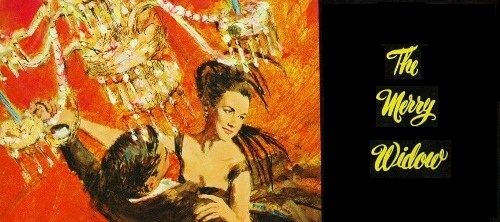The Merry Widow de Franz Lehar, opérette européenne (Allemagne), est l’un des plus grands succès des années 1900 à Londres et à Broadway où elle est la cinquième plus longue série du théâtre musical de la décennie. Sa production à Broadway est la plus influente de son époque et a profondément modifié l'évolution du théâtre musical américain.
In Vienna, Die Lustige Witwe has been revived numerous times -- an appropriate fate for the most popular Viennese operetta of all time. It remains a regular feature in the Vienna Volksopera's repertory, a giddy echo of the city's Imperial heyday. However, no one can accuse the Viennese of treating their most popular operetta as a sacred relic. The Volksopera released a complete live performance of this classic on CD, interpolating Offenbach's famous "Can-Can" from Orpheus in the Underworld. For better or worse, this has inspired the same interpolation in other productions worldwide.
London welcomed back The Merry Widow in 1923 for a 239 performance run, as well as further runs in 1924 and 1932. A 1943 revival racked up 302 performances. Most of these productions featured George Graves, the original West End Popoff. Madge Elliott and Cyril Ritchard starred in a 1944 staging, June Bronhill and Thomas Round headlined in 1958, and Lizbeth Webb and John Rhys Evans topped the short-lived 1969 London cast.
Broadway saw only one commercial revival, staged by the New Opera Company in 1943. The perfect escapist treat for wartime audiences, this vaguely updated Widow featured Polish tenor Jan Kiepura and his wife Marta Eggerth in the leads, colorful sets by Howard Bay, and choreography by George Balanchine. Delighted audiences kept it running for 322 performances in the same year that Oklahoma brought a spirit of change to the musical theatre.
With the appearance of long playing records in the mid-20th Century, full length recordings of The Merry Widow appeared. Mostly in German, these LP sets helped to re-fuel international interest in Lehar's operetta. Major opera companies began adding the work to their repertories. Several of the world's greatest sopranos were delighted to find a role that allowed them to look glamorous, sing a show stopping aria ("Vilja") and enjoy the rare luxury of a happy ending.
